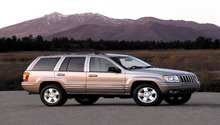Jeep Grand Cherokee 1999-2004: General Information and Recommended Maintenance Schedule
The Jeep Grand Cherokee requires regular maintenance and care. Here's what you'll need to know to keep your vehicle running smoothly.
This article applies to the Jeep Grand Cherokee (1994-2004).
It's no secret. If you want your Jeep Grand Cherokee to continue running smoothly for miles down the road, you'll need to follow your general maintenance schedule and have some needed repair work done in a timely manner to avoid further damage. Keeping your vehicle's major systems clean and in good working order is the key to maintaining your vehicle and minimizing your risk of costly repairs later on. We've compiled a rundown of the general information and recommended maintenance you'll need to keep your vehicle well and kicking for years to come.
Basic Issues
Fluids
To maintain the health of your Jeep, it's recommended that you keep all system fluids clean and topped up. These include your engine oil, transfer case fluid, front and rear differential fluids and transmission fluid.

Tune-up
A tune-up is the easiest way to extend the life of your vehicle. Generally speaking, you'll want to have your jeep tuned up every 25k to 30k miles. If your check engine light displays on the dashboard, or your Jeep appears less responsive than usual or knocks while in use, it's most likely time for your vehicle to undergo a tune-up. Other signs that it is time for a tune-up include a drop in fuel economy, difficult starts, rough idling, and stalling. During the tune-up process, your local Jeep dealer or mechanic will change your spark plugs, including the wires, and replace your air and fuel filters as well as update your PCV (positive crankcase ventilation) valve. After your tune-up is complete, you can expect to experience improved fuel economy and a smoother ride while out on the road.

Transmission Care
It's important that you maintain your transmission as your vehicle ages. This includes changing your filter and fluid every 30k miles and being aware of any trouble codes that display in your vehicle. To read your vehicle's trouble codes, you'll need to purchase an on-board diagnostic tool, if you do not already own one. Have your vehicle serviced immediately if your transmission goes bad. Keeping your engine in good working condition (e.g., tuned up) will also help to keep your transmission in good working order.

Common Issues
Perform Service Warning Light
The "perform service" warning light will display on your dashboard when the pre-set interval time between service appointments has been reached. Have your vehicle serviced immediately and reset the warning light.
Transmission Problems
When it comes to the Jeep Grand Cherokee, you'll want to keep an eye on your transmission as your vehicle ages. Common problems include, but are not limited to: Lack of response, clunking sounds, low or leaking fluid, gears slipping and a dragging clutch. The immediate, tell-tale signs of a bad transmission include the presence of a burning smell coming from your car and jerkiness while you drive.
Blown Head Gasket
If your head gasket blows, you'll need to replace it immediately. Common warning signs of a head gasket that is in trouble include: Loss of engine oil and/or coolant (with or without the presence of visible leaks in or around the respective reservoir), knocking noises and high engine temperatures.
A head gasket that is blown will present the following problems: Overheating with a significant loss in coolant, smoke coming from the exhaust pipe while you drive, and white, milky oil.
Related Discussion
- What's Up V8 WJs - CherokeeForum.com






